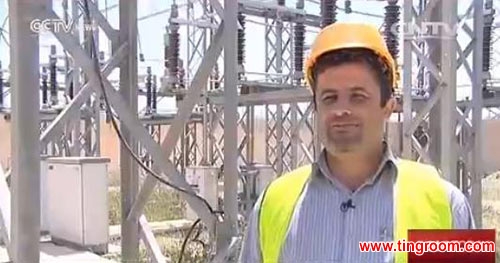CCTV9英语新闻:'Life in Syria' ep.4: Syrian electricity workers struggle to keep power on(在线收听)
Electricity is taken for granted in much of the world. But in a country going through a devastating war like Syria, providing this simple necessity is a daily challenge for workers struggling to keep the power. Generating stations and cables are targets for repeated attacks, and so are the workers who maintain them.
The view from the top of this pylon is scary, but for Ahmad, it's an ordinary view. These are pictures from a power company technician's smart-phone. The city ahead is Kesweh - a rebel held city near Damascus, and the constant front-line of relentless clashes.
But that's not the only reason why this is a life threatening job.
"Power stations have been attacked frequently since the beginning of the war. Gunmen think they can pressure the government this way, and every time the power goes out after an attack we have to fix it. We can't leave people in the dark," said Ahmad technician, Syrian Public Power Company.
For each man on the Syrian power company's maintenance teams, the job is clear: keep the lights on at any cost. Though sometimes the cost is higher than expected.

For each man on the Syrian power company's maintenance teams, the job is clear: keep the lights on at any cost. Though sometimes the cost is higher than expected
"Back in 2013, we were trying to fix a damaged cable after it was cut. We got there and started working. Little did we know that a sniper was lurking, and he started shooting at us. I was shot in the leg and my colleague Khaled Kalouh was killed," he said.
For the Syrian government, keeping a normal pace of life is a priority. Maintaining power is at the heart of this strategy, and because of that, the public owned power sector is always on full alert.
"A few days ago, they blew up one of the main lines serving Damascus city just after midnight, and we had to rush there to repair it. We can't leave the capital without power; there are hospitals, and many people who use electricity for heating, because they can’t afford diesel, or can't get it," said Adnan, Cable Maintenance Team.
Workers get on with their business, putting together the nuts and bolts, that provide this basic service, that has become so difficult and costly in this time of war.
The sun sets on Damascus, ending another day of violence and hardship. As the dark engulfs the city, the work of the maintenance teams we spend the day with starts to make sense.
Keeping the lights on in the capital of a country at war is certainly not an easy job, but for many Syrians, maintaining a normal pace of life is a cause worthy of sacrifices, hard labour and sometimes personal injury.